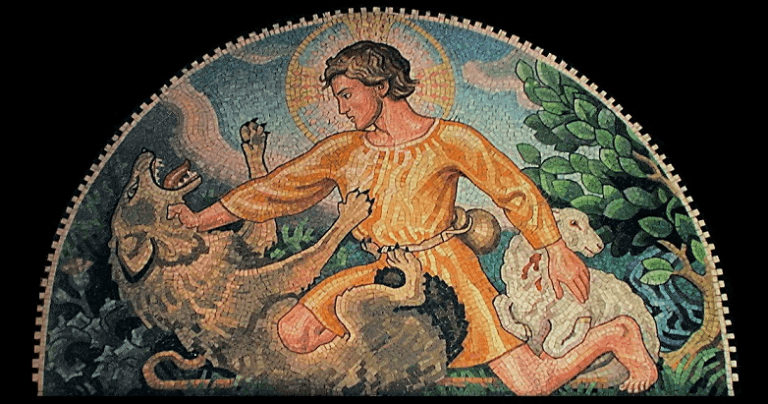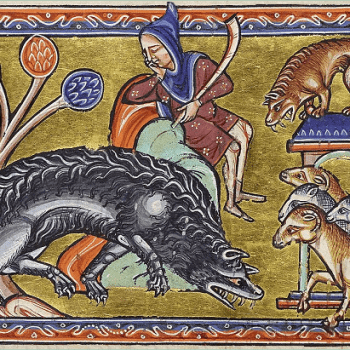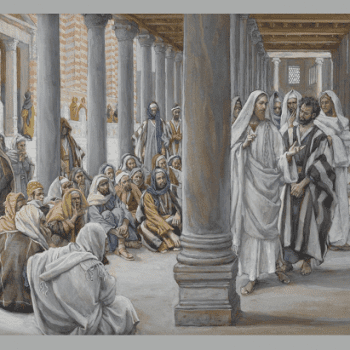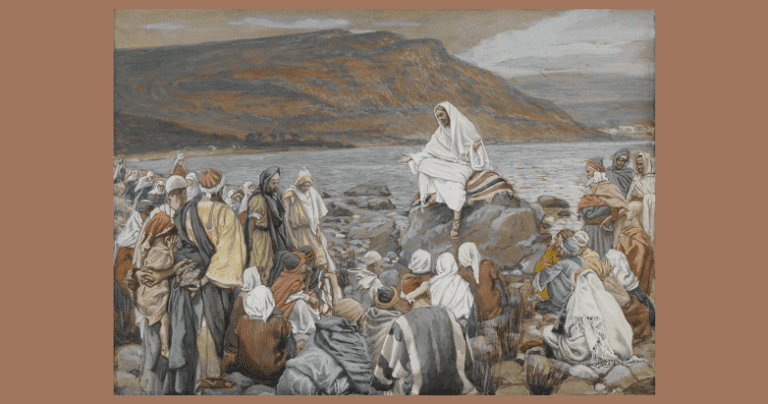
I am the good shepherd.
A good shepherd lays down
his life for the sheep.
John 10:11-18 for the Fourth Sunday of Easter
The next and last time Jesus will speak about a shepherd and sheep will be in a confrontation with his apostle Peter.
We know that when Jesus was arrested Peter ran away and three times denied knowing Jesus.
After Jesus rose from the dead he confronted Peter and demanded to know if Peter really loved him.
When Peter answered that he cared for Jesus, Jesus gave him three commands about being a shepherd.
Feed my lambs!
Tend my sheep!
Feed my sheep!
Then Jesus predicted how Peter would one day die for the sheep of Jesus.
Today’s Gospel describes the death and resurrection of Jesus.
It describes the cowardice of Peter in running away.
It also describes how Peter, in the end, would die while faithfully feeding and tending the sheep of Jesus.
Read again part of today’s Gospel, and see how it foretells Peter running away at the arrest of Jesus.
A hired man, who is not a shepherd,
and whose sheep are not his own,
sees a wolf coming and leaves the sheep and runs away,
and the wolf … scatters them.
This is because he works for pay and has no concern for the sheep.
Today’s Gospel describes Jesus; but it also describes the faithful ending of Peter’s life.
I am the good shepherd.
A good shepherd lays down his life for the sheep.
As we have seen, the next and last time Jesus speaks of sheep and shepherd will be when he asks Peter if he really loves him.
Today’s Gospel, then, about shepherd and sheep, is also about real love.
Real love is self-sacrifice for the good of others.
Feed my lambs!
Tend my sheep!
Feed my sheep!
A good shepherd lays down his life for the sheep.
There is something mysterious about the death of Jesus the good shepherd; and he speaks today of the mystery.
… I lay down my life
in order to TAKE IT UP AGAIN.
No one TAKES it from me,
BUT I lay it down ON MY OWN.
I have power to lay it down,
and power to TAKE IT UP AGAIN.
Real love, then, not only lays down its own life for the good of others.
Real love even has power to rise from the dead.
Let us take courage from that when real love demands self-sacrifice from us.
When Jesus asked Peter, “Do you love me?” Jesus was not asking about Peter’s feelings.
Peter and his “feelings” RAN AWAY when the soldiers arrested Jesus.
When Jesus asked Peter, “Do you love me?” Jesus was asking for a decision, a choice, not for feelings.
Real love is not a mere feeling.
Real love is a decision, a choice, a conscious use of freedom, an act of the will.
That is the reason for the last words Jesus spoke today about his own life.
I have power to lay it down….
This COMMAND I have received from my Father.
Obedience to the command of real love comes from making a decision, from the will, not from the feelings.
It is true that feelings, often strong feelings, go hand in hand with real love.
However, our feelings and the demands of real love also go at each other in hand-to-hand combat.
Real love does demand choices that sometimes contradict our feelings.
Natural common sense tells us that.
We don’t need divine revelation for us to know that.
Our own parents show us that the strength of love for children and for spouses does not lie in feelings, but in the choice to serve even at the cost of one’s feelings and one’s self-sacrifice.
Christ is the Good Shepherd.
Parents, too, are shepherds, feeding their lambs and tending their sheep.
In his Eucharist, Christ the Good Shepherd, is also a Lamb, the Lamb of God, giving himself as food for the sheep, taking away on his own back the sins of the sheep, laying down his life in sacrifice to save the sheep and to give glory to the Father.
God is real love: the freedom and the power to lay down his life, the freedom and the power to take it up again
Turn. Love. Repeat.












